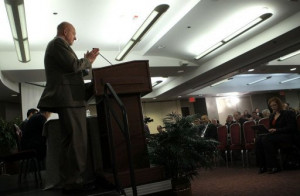
The temptation to relegate basic judgments about other countries to simplifying assumptions must be resisted.
Abstract conceptions of power that are so multifaceted and multidimensional that they have no operational traction must be relied upon less.
Experts, whether academic or practitioner, need to move beyond ‘factor wars’ designed to show that one favorite causal factor is more important than another, concentrating instead on the combined and interactive effects of multiple factors.
The need to avoid hubris is tantamount for it afflicts both communities equally. Jervis’ seminal work on perception and misperception documented how policymakers tended to not subject causal claims to rigorous tests but instead weighed firsthand experience more than they should and engaged in sloppy searches for causes, typically grabbing on to topical events. Intelligence analysts are meant to be trained to avoid such bias but it is clear from the first decade of the 21st century that not every analyst or intelligence agency follows this code zealously. Not to be outdone, some have rightfully pointed out how academic scholars can also bring their own preconceptions to the table: it is not entirely uncommon to find the egocentric academic doubtful that anyone in the intelligence community is capable of having a ‘rigorous’ idea. Swinging the hubristic pendulum back in the other direction again, some have noted how getting academics ‘to write tersely, to focus more on their findings and less on the preambular contextual backdrop, and to venture future outlooks in their written assessments has often proved difficult.’ In short, both academics and practitioners need to think more carefully about their own analytical glass houses before they lob stones in any particular direction.
Despite the already existing rules on both sides to avoid such thinking, preconception that begets misperception that begets faulty intelligence analysis continues to afflict both academics and practitioners alike. The only ‘remedies’ offered to overcome this problem deal mostly in homilies, such as think smarter, put things together better, and stick with only the preconceptions that are accurate. How to do any of this is left mostly unexplored, of course, except to advise consulting people with alternative points of view. Indeed, perhaps the biggest preconception of all is attitudinal. Instead of finding mutually enhancing connectivity, efforts seem to reinforce working separately but adequately: academics can swing principles of academic freedom and methodological purity like hammers of condemnation, proclaiming their open source insights more valuable and more accurate than classified materials, while practitioners can dismissively note how academics often bend their own research rules in order to justify heavy financial investments and ensure positive tenure decisions. These accusations are not absent foundations in reality, and indeed could be subjects for their own individual research projects, but their importance here is that they are hyperbolic and only exacerbate the interaction problem.
These problems only intensify in institutions trying to develop Intelligence Studies programs. A small sub-group of institutions known as ‘military-friendly schools’ have long specialized in degree programs catered to Intelligence Community interests. While not trying to disparage in any way, a major problem has been a tendency to be too heavily imbalanced towards part-time, adjunct ‘professional’ faculty. There can be no doubt that real-world experience adds depth and detail to a program. When a program, however, is dominated by such, and when those professionals serve only in an adjunct capacity, then the resulting program impact is negative. The critical analytical thinking skills mentioned above are quintessentially academic and best taught by terminally-degreed, full-time faculty dedicated to promoting them.
The even bigger danger: as more schools have tried to develop degree programs focused on intelligence and national security, they have followed the military-friendly school model, poaching retired IC professionals to fill their programs with adjunct, part-time faculty without surrounding them in an academic setting. This dominance by practitioners-as-teachers has given a false impression of harmony and an illusory conclusion that the best Intelligence Studies programs need little participation from academic actors and no scholarly foundation. Degree programs infused with professionals but not backboned by trained academics lessen the impact of professional experience: instead of discipline-rich and theoretically-rigorous applicability, programs are left with a decidedly anecdotal and conversational feel. Telling war-stories in the classroom is indeed fascinating, but it does not adequately train the next intelligence generation, whether they are scholars or analysts.
In sum, the three challenges to academic-practitioner cooperation examined here are by no means an exclusive list of problems. The point was not to break down all possible obstacles. Rather, it was to take three very basic but essential aspects of Intelligence Studies research and show that even the most fundamental levels of collaboration and cooperation have significant barriers to overcome. Intelligence Studies cannot move forward if the two communities that form its bedrock foundation have problems settling on definitions, cannot develop rigorous theory, and suffer from too many hubristic preconceptions. Regardless of whatever career aspirations students of Intelligence Studies have, the discipline’s future success will be dependent upon its ability to address these issues at a conceptual, methodological, and theoretical level while still making a priority of empirically-oriented knowledge: those who think it are equally important to those that do it and vice versa.
Dr. Matthew Crosston is Professor of Political Science and Director of the International Security and Intelligence Studies program at Bellevue University, exclusively for the online magazine “New Eastern Outlook”
